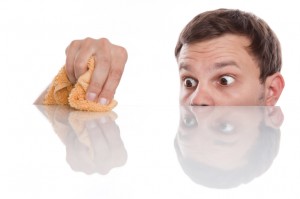Effect and Cause

Is it clean yet?
I worry about cause and effect. If you get them backwards, you wind up chasing your tail. While you’re at it, you can create all kinds of havoc.
Take MS (please). We have long thought of multiple sclerosis as an autoimmune disease. The immune system interprets myelin – the fatty sheath around our nerves – as a threat and attacks it. As it eats away the myelin, it also impairs our ability to send signals from our brain to our limbs. The end result is often spasticity or even paralysis.
We don’t know the cause but the effect is clearly the malfunctioning immune system. Or maybe not. Some recent research suggests that a bacterium may be involved. It may be that the immune system is reacting appropriately to an infection. The myelin is simply an innocent bystander, collateral damage in the antibacterial attack.
The bacterium involved is a weird little thing. It’s difficult to spot. But it’s especially difficult to spot if you’re not looking for it. We may have gotten cause and effect reversed and been looking for a cure in all the wrong places. If so, it’s a failure of imagination as much as a failure of research. (Note that the bacterial findings are very preliminary, so let’s continue to keep our imaginations open).
Here’s another example: obsessive compulsive disorder. In a recent article, Claire Gillan argues that we may have gotten cause and effect reversed. She summarizes her thesis in two simple sentences: “Everybody knows that thoughts cause actions which cause habits. What if this is the wrong way round?”
As Gillan notes, we’ve always assumed that OCD behaviors were the effect. It seemed obvious that the cause was irrational thinking and, especially, fear. We’re afraid of germs and, therefore, we wash our hands obsessively. We’re afraid of breaking our mother’s back and, therefore, we avoid cracks in the sidewalk. Sometimes our fears are rooted in reality. At other times, they’re completely delusional. Whether real or delusional, however, we’ve always assumed that our fears caused our behavior, not the other way round.
In her research on OCD behavior, Gillan has made some surprising discoveries. When she induced new habits in volunteers, she found that people with OCD change their beliefs to explain the new habit. In other words, behavior is the cause and belief is the effect.
Traditional therapies for OCD have sought to address the fear. They aimed to change the way people with OCD think. But perhaps traditional therapists need to change their own thinking. Perhaps by changing the behaviors of people with OCD, their thinking would (fairly naturally) change on its own.
This is, of course, quite similar to the idea of confabulation. With confabulation, we make up stories to explain the world around us. It gives us a sense of control. With OCD – if Gillan is right – we make up stories to explain our own behavior. This, too, gives us a sense of control.
Now, if we could just get cause and effect straight, perhaps we really would have some control.
Travis,
If Clostridium Perfringens is found in more MS patients, someone should look for a high level of this bacteria in the Colorado soil, as we have a high incidence of MS. Is there a test for it? Of course, we then encounter the cause/effect problem of your other article. Does MS allow for higher levels of the bacteria in the body or does the bacteria cause MS? A conundrum indeed!
Bill
Hi Travis:
This article about Effect and Cause is really interesting – starting from the title (generally one says Cause and Effect!) I’m sending a copy to my sister who has MS. Thanks for sharing.
Abraços.
Adelaide